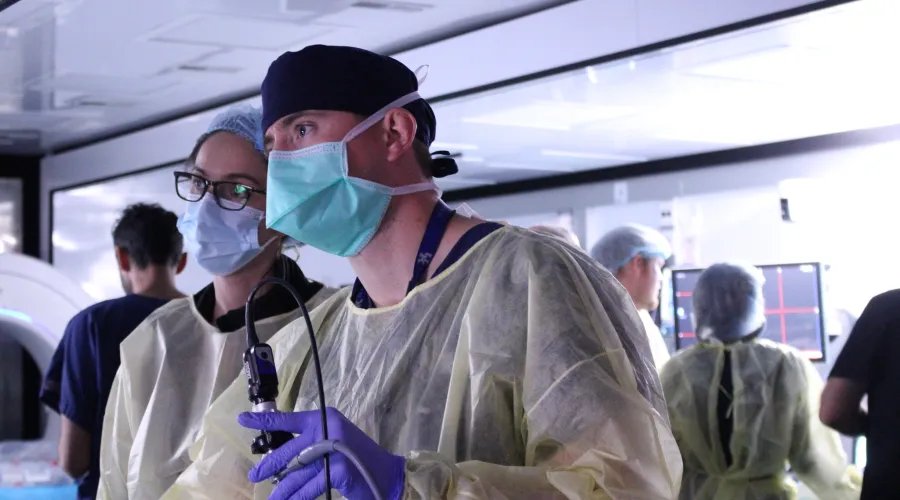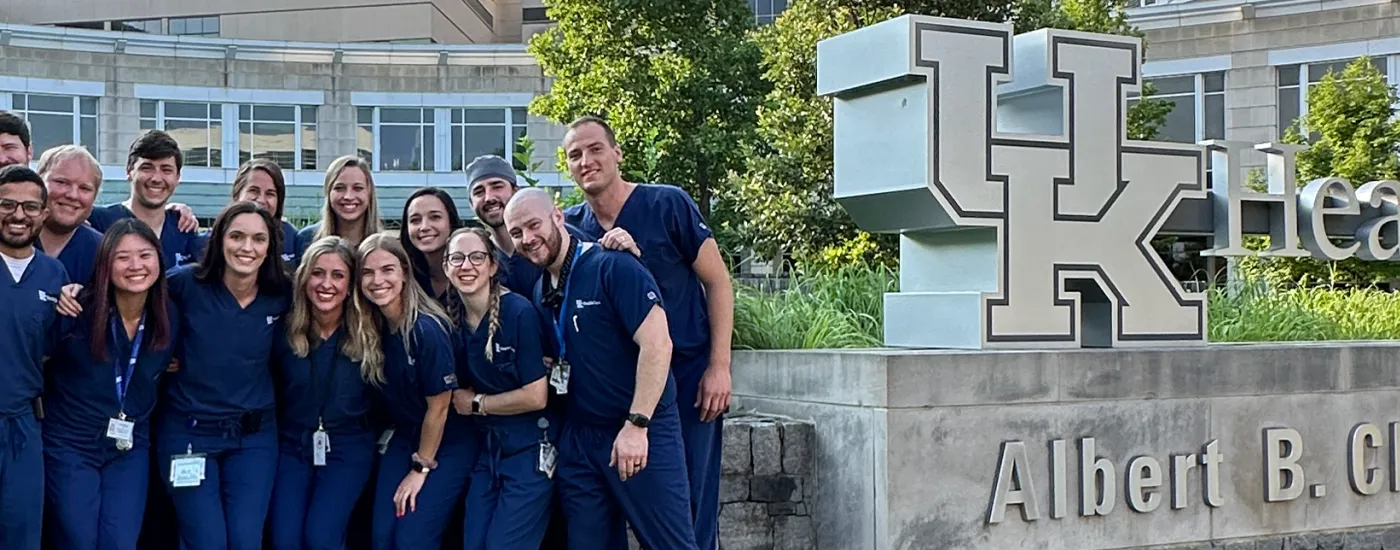
Residency Rotations
Intern Year
Internship training is comprised of twelve one-month rotations. ENT interns spend six months with the Otolaryngology – HNS service. Interns rotate through the following fields of general surgery: pediatric surgery, endocrine surgery, and critical care (ICU) medicine. First-year residents also receive experience in oral surgery and radiation oncology. Internship training is primarily directed at achieving proficiency in pre- and post-operative surgical care. Additionally, interns receive basic operative and clinical training. Time in the operating room typically consists of primary surgeon for less-complex cases and assisting in more-complex cases. Interns take primary floor call during daytime hours; weekend call is rotation-dependent. The internship year also serves to provide invaluable knowledge about the inner-workings of the hospital, and fosters the formation of relationships with colleagues within the A.B. Chandler Medical Center and Veterans Administration Hospital.
Sample UK Otolaryngology Resident Schedule
| Year | Resident | July | August | Sept | Oct | Nov | Dec | Jan | Feb | Mar | Apr | May | June |
|---|---|---|---|---|---|---|---|---|---|---|---|---|---|
| 5 | 1 | B | B | C | C | A | A | C | B | A | A | C | B |
| 5 | 2 | A | A | C | C | B | B | A | A | B | B | C | C |
| 5 | 3 | C | C | B | B | A | B | C | C | A | A | B | A |
| 5 | 4 | B | B | A | A | C | C | B | B | C | C | A | A |
| 4 | 1 | Peds | Peds | A | Res | GS Endo | A | C | B | Peds | Peds | B | C |
| 4 | 2 | A | GS Endo | C | A | Peds | Peds | B | Res | C | B | Peds | Peds |
| 4 | 3 | C | A | Peds | Peds | B | GS Endo | Peds | Peds | Res | C | B | A |
| 3 | 1 | VA | Res | B | VA | C | VA | A | A | B | Res | C | C |
| 3 | 2 | Res | C | A | C | VA | Res | C | VA | A | B | VA | B |
| 3 | 3 | C | B | VA | A | A | C | Res | B | VA | C | Res | VA |
| 3 | 4 | A | VA | Res | B | B | C | VA | C | C | VA | A | Res |
| 2 | 1 | C | Peds | B | Peds | C | Peds | B | C | A | A | A | B |
| 2 | 2 | A | C | Peds | B | B | A | A | C | C | Peds | B | Peds |
| 2 | 3 | B | A | A | C | C | B | Peds | A | Peds | B | Peds | C |
| 2 | 4 | Peds | C | C | A | Peds | A | A | Peds | B | C | B | B |
| Interns | July | August | Sept | Oct | Nov | Dec | Jan | Feb | Mar | Apr | May | June | |
| 1 | 1 | ENT | EGS ICU | Rad Med | Peds ENT | Ped Surg | ENT | ENT/All/Aud | GS Endo | OMFS | Peds ENT | GS Endo | Peds ENT |
| 1 | 2 | Peds ENT | ENT | Ped Surg | EGS ICU | Peds ENT | OMFS | Peds ENT | ENT | Rad Med | GS Endo | ENT/All/Aud | GS Endo |
| 1 | 3 | Ped Surg | Peds ENT | ENT | GS Endo | ENT | GS Endo | EGS ICU | Peds ENT | ENT/All/Aud | OMFS | Peds ENT | Rad Med |
| 1 | 4 | GS Endo | Ped Surg | Peds ENT | ENT | Rad Med | Peds ENT | GS Endo | EGS ICU | Peds ENT | ENT/All/Aud | OMFS | ENT |
PGY2 - PGY5 Rotations
The residency program is designed to ensure all residents receive excellent, well-rounded clinical and surgical training in all aspects of Otolaryngology – HNS. Clinical training occurs at multiple sites, including the Ear, Nose, and Throat – Hearing and Balance Clinic, the state-of-the-art Markey Cancer Center Clinic, and the Veterans Affairs Hospital. Operative training occurs within the A.B. Chandler Medical Center, the Center for Advanced Surgery, the Veterans Affairs Hospital, and Good Samaritan Hospital. Additionally, residents spend time in a community-practice setting at St. Claire regional hospital. A multidisciplinary approach exists in all locations, and residents interact extensively with both in-clinic audiologists and speech-language pathologists.
UK Otolaryngology runs via a team-based approach. The team system promotes several goals, as related to patient care, medical education, and personal and professional development. First, senior residents are typically on a team for multiple months in a row, promoting continuity of patient care as well as training in team leadership. Senior residents are expected to serve as leaders and mentors by their actions as much as their words. This includes equitable distribution of cases, great support on consults (particularly early in the academic year), and impeccable organizational skills. Junior residents are expected to learn the leadership qualities being modeled by senior residents and become more and more facile at managing consults and general patient care independently. Secondly, the team system promotes development of teamwork, as the team unit functions for at least one month together at a time before changing services. Finally, the team system allows ancillary staff and patients to have familiar names and faces on a consistent basis, and this, we believe, improves patient satisfaction and outcomes.
Team A
Team A focuses on otology, neurotology, and laryngology. During their time on Team A, residents are supervised by Dr. Jones, Dr. Bush, Dr. McNulty, Dr. Cass, Dr. Fritz, and Dr. Jonas. Residents initially learn diagnostic skills in neurotology and laryngology, followed by more-and-more complex otologic and neurotologic surgery. UK neurotologists have significant numbers of patients with chronic ear disease, and UK has the largest cochlear implant program in Kentucky. Time on Team A is also spent at a community clinic in Morehead, Kentucky.
Team B
Team B provides training in general otolaryngology, rhinology and endoscopic skull base surgery, and facial plastic surgery. The rhinologists have a significant volume of patients who require extensive surgical and medical managment of various subtypes of chronic sinusitis, as well as pathology of the anterior skull base. Our facial plastic surgeons perform an extensive number of primary and revision rhinoplasties, in addition to in-office procedures. Team B supervising physicians include Dr. Archer, Dr. Patel, Dr. Comer, Dr. Saini, and Dr. Gupta.
Team C
Team C provides intensive training in extirpative and local reconstructive techniques, microvascular reconstructive surgery, transoral robotic surgery (TORS), laryngology and airway reconstruction, sialoendoscopy, and laser surgery. Residents experience a very high surgical volume on this team, with extensive exposure to perioperative care of complex head and neck oncology patients. Teaching faculty members on Team C include Dr. Valentino, Dr. Aouad, Dr. Windon, and Dr. Dunlap.
Pediatric Team
The Pediatric Otolaryngology team performs a significant volume of cases involving comprehensive pediatric otolaryngology care. Cases range from basic ear tubes and tonsillectomies to cases as complex as laryngotracheal reconstructions, congenital neck mass removal, and cochlear implantation. The team is set up to include an intern, a PGY-2, and a PGY-4. This allows the intern and PGY-2 to experience a significant number of surgical cases early in residency. The team format also allows the PGY-4 to serve as a Chief of the peds team, learning components of effective leadership, effective case distribution, and organizational skills expected of senior residents in this residency program. Faculty members of Peds Team include Dr. Iverson, Dr. Azbell, Dr. Fiorillo, and Dr. Smith.
VA Rotation
Each PGY-3 resident serves as the VA resident for three months of the year. The VA resident is involved in all VA ORs for general ENT and Head & Neck Oncology, as well as all clinics. Currently VA ENT clinic runs on Wednesday morning, and VA H&N clinic runs on Wednesday afternoon. In a typical month, the VA resident will cover approximately ten ORs, which provides considerable experience with general ENT cases as well as more complex Head & Neck Oncology cases. The purpose of the VA resident is to provide outstanding continuity of care to our veterans, as well as serve as a unified contact point for VA personnel with regards to otolaryngologic care.
Research
Residents are given three total months of dedicated research time to cultivate research projects of their interest under guided mentorship. Two total months are spent as a PGY-3 and one month as a PGY-4.
Allergy and Audiology
We now also incorporate dedicated 2-week allergy and audiology rotation during the intern year. This rotation will allow the resident to immerse themselves in all facets of allergy and audiology, with hands-on experience with activities such as audiograms, allergy vial mixing, etc.
Endocrine Surgery
A dedicated one-month endocrine rotation occurs during the PGY-4 year, where the resident focuses intensively on thyroid and parathyroid surgery as well as in-office ultrasound.
